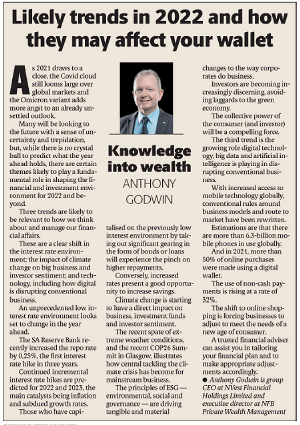Likely trends in 2022 – and how they may affect your wallet…
Three trends are likely to be relevant to how we think about and manage our financial affairs in 2022


Interest rates, climate change, and technological advancement: With uncertainty and trepidation looming large, how are these key themes likely to shape the financial and investment environment for 2022 and beyond? What adjustments to your financial plan should you be considering to position yourself for change?
Whilst there is no magic crystal ball to predict exactly what the year ahead holds in store, there are certain themes that are likely to play a fundamental role in shaping the financial and investment environment for 2022 and beyond. In particular, three trends are likely to be relevant to how we think about and manage our financial affairs.
An unprecedented low interest rate environment looks set to change in the year ahead. The South African Reserve Bank recently increased the repo rate by 0,25%, notable given that it was the second interest rate hike in three years. Continued incremental interest rate hikes are predicted for both 2022 and 2023, the main catalysts being inflation and subdued growth rates.
This shift in higher interest rates cuts both ways. Those that have capitalised on the previously low interest environment by taking out significant gearing in the form of bonds or loans will experience the pinch on higher repayments. Conversely, likely increased rates present a good opportunity to increase savings going forward. So, keep an eye on interest rate movements through the year and consider adjusting your debt versus savings profile accordingly to optimise your position.
While climate change has been a topic of conversation for several years already, it’s now very real and starting to have a direct impact on business, investment funds and investor sentiment. The recent spate of extreme weather conditions, including unprecedented flooding in various parts of the world, as well as the recent COP26 Summit in Glasgow, illustrates how central tackling the climate crisis has become for mainstream business.
ESG is no longer just a label. The principles of ESG - environmental, social and governance - are now driving tangible and material changes to the manner in which corporates do business. Investors are becoming increasingly discerning and demanding regarding what they invest in, avoiding laggards to the green economy.
Early indications are that the collective power of the consumer (and investor) is going to be a compelling force, putting pressure on multinational boardrooms to genuinely embrace the climate challenge by reducing carbon emissions and rebooting their products and propositions to be more environmentally friendly. Don’t expect the sustainability agenda to be disappearing anytime soon.
The third trend - and one that is gaining significant momentum - is the growing role that digital technology, big data and artificial intelligence is playing in disrupting conventional business. With increased access to mobile technology globally and the internet providing a virtual online shop window, the conventional rules around business models and route to market have effectively been rewritten.
Estimations are that there are currently more than 6.3 billion mobile phones in use globally, up from an estimated 3.6 billion in 2016. This trend represents a growing and interconnected ‘blue ocean’ market which companies (especially financial services) are penetrating quicker and at less cost, providing exponential growth opportunities.
In 2021, more than 50% of online purchases were made using a digital wallet. The use of non-cash payments are rising at a rate of 32%. This year digital payments are predicted to potentially overtake cash transactions for the first time ever. This shift to online shopping is forcing businesses to adjust their model to meet the needs of a new age of consumer who is receiving, spending and investing their money in very different ways. Unless businesses embrace this change they may well be left behind.
Although it’s impossible to escape uncertainty, it’s more important than ever to have a trusted financial advisor to assist you in tailoring your financial plan and to make appropriate adjustments accordingly.
As English novelist Dame Margaret Drabble once famously said; “When nothing is sure, everything is possible”.
It is more important than ever to have a trusted financial advisor to assist in planning for 2022. Let an NFB Private Wealth Manager build a personal financial strategy to guide your success.
Press Releases
 |
This article was published in The Herald |
||













